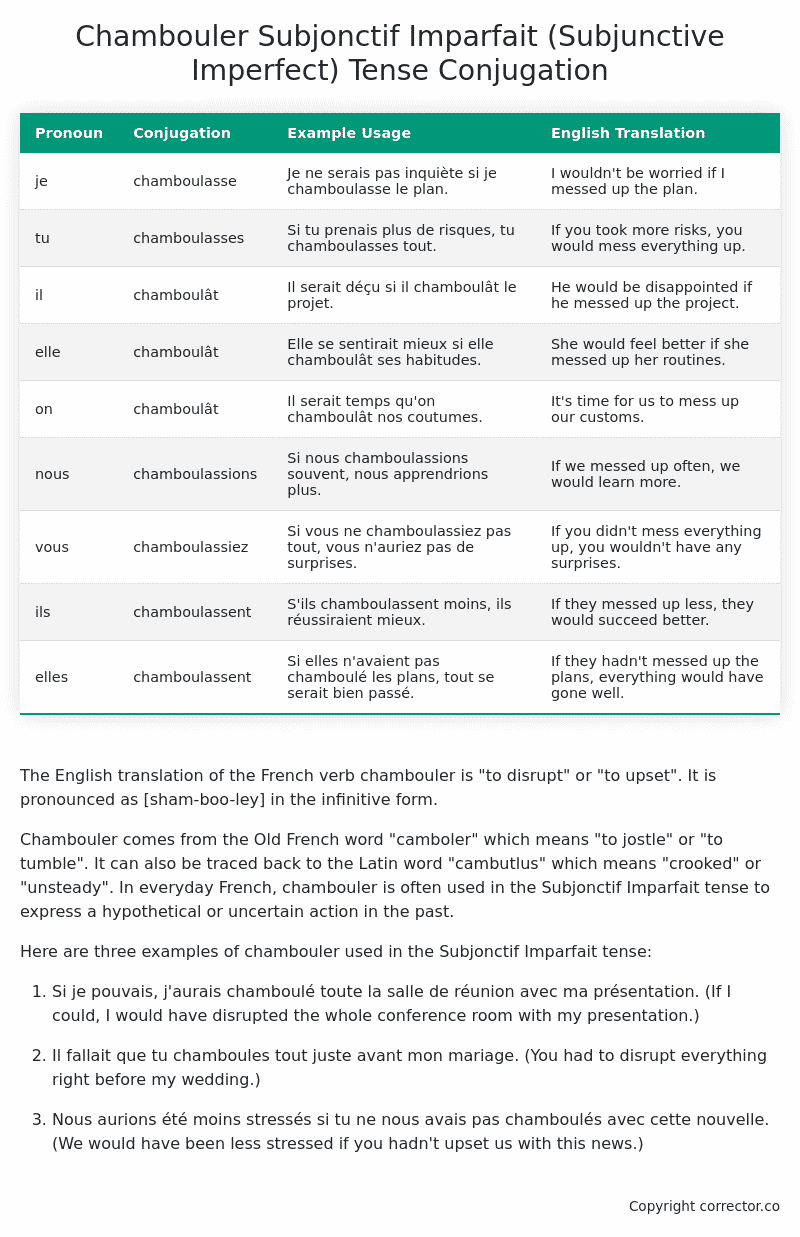Subjonctif Imparfait (Subjunctive Imperfect) Tense Conjugation of the French Verb chambouler
Introduction to the verb chambouler
The English translation of the French verb chambouler is “to disrupt” or “to upset”. It is pronounced as [sham-boo-ley] in the infinitive form.
Chambouler comes from the Old French word “camboler” which means “to jostle” or “to tumble”. It can also be traced back to the Latin word “cambutlus” which means “crooked” or “unsteady”. In everyday French, chambouler is often used in the Subjonctif Imparfait tense to express a hypothetical or uncertain action in the past.
Here are three examples of chambouler used in the Subjonctif Imparfait tense:
-
Si je pouvais, j’aurais chamboulé toute la salle de réunion avec ma présentation. (If I could, I would have disrupted the whole conference room with my presentation.)
-
Il fallait que tu chamboules tout juste avant mon mariage. (You had to disrupt everything right before my wedding.)
-
Nous aurions été moins stressés si tu ne nous avais pas chamboulés avec cette nouvelle. (We would have been less stressed if you hadn’t upset us with this news.)
Table of the Subjonctif Imparfait (Subjunctive Imperfect) Tense Conjugation of chambouler
| Pronoun | Conjugation | Example Usage | English Translation |
|---|---|---|---|
| je | chamboulasse | Je ne serais pas inquiète si je chamboulasse le plan. | I wouldn’t be worried if I messed up the plan. |
| tu | chamboulasses | Si tu prenais plus de risques, tu chamboulasses tout. | If you took more risks, you would mess everything up. |
| il | chamboulât | Il serait déçu si il chamboulât le projet. | He would be disappointed if he messed up the project. |
| elle | chamboulât | Elle se sentirait mieux si elle chamboulât ses habitudes. | She would feel better if she messed up her routines. |
| on | chamboulât | Il serait temps qu’on chamboulât nos coutumes. | It’s time for us to mess up our customs. |
| nous | chamboulassions | Si nous chamboulassions souvent, nous apprendrions plus. | If we messed up often, we would learn more. |
| vous | chamboulassiez | Si vous ne chamboulassiez pas tout, vous n’auriez pas de surprises. | If you didn’t mess everything up, you wouldn’t have any surprises. |
| ils | chamboulassent | S’ils chamboulassent moins, ils réussiraient mieux. | If they messed up less, they would succeed better. |
| elles | chamboulassent | Si elles n’avaient pas chamboulé les plans, tout se serait bien passé. | If they hadn’t messed up the plans, everything would have gone well. |
Other Conjugations for Chambouler.
Le Present (Present Tense) Conjugation of the French Verb chambouler
Imparfait (Imperfect) Tense Conjugation of the French Verb chambouler
Passé Simple (Simple Past) Tense Conjugation of the French Verb chambouler
Passé Composé (Present Perfect) Tense Conjugation of the French Verb chambouler
Futur Simple (Simple Future) Tense Conjugation of the French Verb chambouler
Futur Proche (Near Future) Tense Conjugation of the French Verb chambouler
Plus-que-parfait (Pluperfect) Tense Conjugation of the French Verb chambouler
Passé Antérieur (Past Anterior) Tense Conjugation of the French Verb chambouler
Futur Antérieur (Future Anterior) Tense Conjugation of the French Verb chambouler
Subjonctif Présent (Subjunctive Present) Tense Conjugation of the French Verb chambouler
Subjonctif Passé (Subjunctive Past) Tense Conjugation of the French Verb chambouler
Subjonctif Imparfait (Subjunctive Imperfect) Tense Conjugation of the French Verb chambouler (this article)
Subjonctif Plus-que-parfait (Subjunctive Pluperfect) Tense Conjugation of the French Verb chambouler
Conditionnel Présent (Conditional Present) Tense Conjugation of the French Verb chambouler
Conditionnel Passé (Conditional Past) Tense Conjugation of the French Verb chambouler
L’impératif Présent (Imperative Present) Tense Conjugation of the French Verb chambouler
L’infinitif Présent (Infinitive Present) Tense Conjugation of the French Verb chambouler
Struggling with French verbs or the language in general? Why not use our free French Grammar Checker – no registration required!
Get a FREE Download Study Sheet of this Conjugation 🔥
Simply right click the image below, click “save image” and get your free reference for the chambouler Subjonctif Imparfait tense conjugation!

Chambouler – About the French Subjonctif Imparfait (Subjunctive Imperfect) Tense
Formation
Common Everyday Usage Patterns
Interactions with Other Tenses
Subjonctif Présent
Indicatif Passé Composé
Conditional
Conditional Perfect
Summary
I hope you enjoyed this article on the verb chambouler. Still in a learning mood? Check out another TOTALLY random French verb conjugation!


